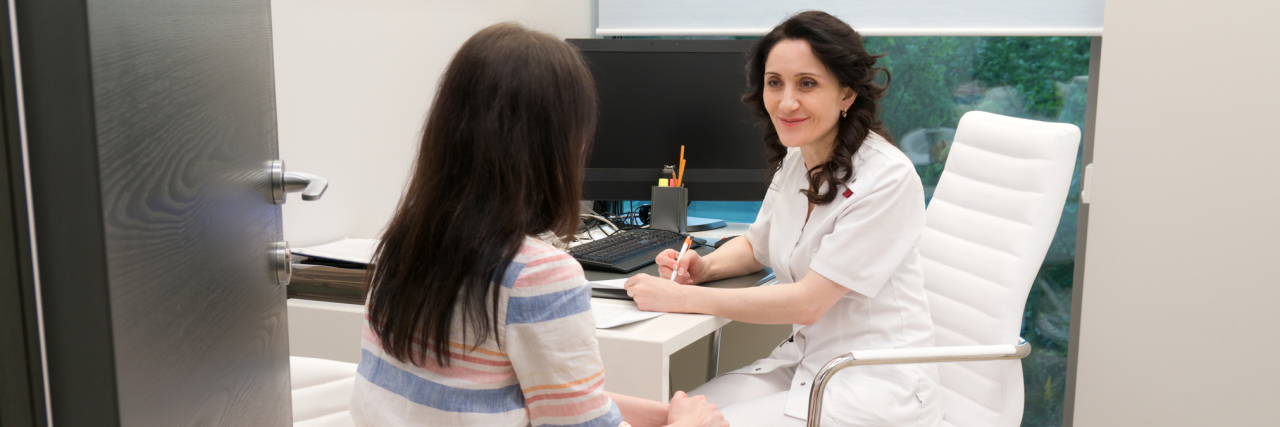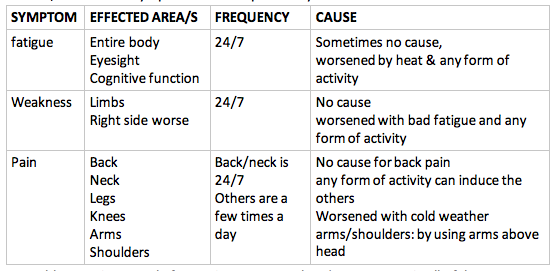Doctor appointments can be very daunting and overwhelming when you’re chronically ill – especially if you are undiagnosed like myself. It’s so easy to get caught up in the stress and frustration of doctor appointments and have them be unproductive and unpleasant. To avoid this, however, I have come up with a list of 10 things to make doctor appointments more productive when you are chronically ill and undiagnosed.
1. A list of your medications
It’s so important to keep track of what medications you are taking and the required dosage of each one. I would suggest making a list of all the medication you are taking, how much of each you take, when you take them and what symptom you take them for. If you want to go one step further, I would recommend adding your past medications and why you stopped taking them also.
If any of your current treatments are not working as effectively as they should, it is also important to note that too. Your list of medications should include vitamins and supplements as well. While you may know these details without writing them down, sometimes it’s easy to mix up the dosage or forget a medication entirely.
2. A comprehensive symptom list
I have a month-to-month list which describes when specific symptoms get worse and when a potential new symptom arises. When you only have a short time in with a doctor, you don’t have time to remember when you started experiencing new symptoms. It is also easier to make connections between your symptoms and circumstances, like the weather or activity level, if you include these details. If you haven’t started making a list like this, I strongly suggest you do. Even better would be to make daily notes of your symptoms and then condense this before an appointment. I’ve recently started using the app Flaredown which allows you to enter daily information on your symptoms. This app is free for Android and Apple users.
3. A summary of your main symptoms
While the comprehensive list is very useful, it is hard to flick through pages of data in an appointment. I highly recommend making a neat table which documents your most important symptoms, what areas are affected, the frequency of the symptom and what causes/worsens the symptom. Here is a part of my table:
My table contains a total of 15 major symptoms but does not contain all of them. You could also include a column where you list any treatments you use for the particular symptom and their effectiveness.
4. A print-out of your results
While your doctor may have some or most of your test results, it doesn’t hurt to carry a physical copy in case they don’t. My GP’s (general practitioner) office was able to print this all out for me because I have all my results sent there no matter which specialist ordered the test. Depending on how many specialists you see, I recommend organizing your results by the field of medicine related to it. For example, I have my results organized by: neurology, cardiology, endocrinology and basic bloods.
5. A list of questions for the doctor and what you
would like from the appointment
Brain fog makes it hard for me to remember everything I wanted to
ask my doctor, so I make a list of the things I need to ask them about. These can be small questions about particular tests or bigger questions about particular diagnoses. I always go into an appointment with a goal. Sometimes this goal is to try a new form of pain relief, othertimes my goal is to undergo more tests and check certain levels. Whatever it is, it is so easy to become overwhelmed and not get what you want from an appointment, so you leave feeling unaccomplished. That is why I always make lists with these things written down.
6. Things you want to be tested for and why
As I spoke about in “To Google or Not to Google,” we are constantly finding potential answers to our symptoms that we have legitimate cause to want to be tested for. We are also constantly exposed to people telling us what their great aunt’s friend’s cousin had that sounds exactly like what we have. Now this is a tricky one, because in my experiences doctors can be very dismissive when you bring these things to the table because they all seem to hate “Doctor Google,” so you need to be careful in bringing this up.
First, ask their opinion on the illness and ask if they think it would be useful to rule it out. Avoid mentioning that you wildly Googled it and are convinced that you have it. They may follow your advice or they may dismiss it entirely. If you are unhappy with the doctor’s refusal to test you for it, ask for an explanation as to why and go from there.
7. An organized folder with all this information
If your medical records and symptom lists are anything like mine,
you will have a lot of paper to cart around. To make this more organized, I suggest buying a large folder to store it all with basic manila folders to sort each set of documents out. This doesn’t have to be fancy or expensive, just user friendly. Sticky notes make great ‘dividers’ between sheets of paper, for example in your results folder use them to separate between neurology and cardiology results, etc. Organize your documents in a way that you can access the appropriate information quickly and efficiently.
8. Take a notepad and write important things down
Doctor appointments can be very long and filled with an overwhelming amount of information. I always make sure I have a notebook and pen to write down things I am likely to forget. Try and just write down key words instead of full sentences so your concentration remains on your doctor and not your paper. Some doctors may even allow you to record the session to review it later. I always sit down immediately after an appointment and make more extensive notes on what was said while it is fresh in my mind.
9. Bring a support person
Another way to help you remember details from your appointment is by bringing a support person. Make sure this person is someone you are completely comfortable discussing all aspects of your condition with so you don’t skimp on any important details. This person should also be able to step in if you are treated improperly by the doctor. I find having a support person makes you more calm and level-headed in otherwise overwhelming appointments. It’s also good to have someone to debrief with afterwards.
10. Have low expectations to avoid disappointment
and frustration
If you are new to chronic illness or newly “undiagnosed,” this is the most important piece of advice in this whole post. Having high expectations is what made the first few months of my journey absolutely awful. I spoke about this in “The Bad Good News.” Answers don’t always happen overnight so you should be prepared for that. I wish someone had told me this in the beginning to save me so much emotional hardship. I now walk into every appointment with no expectations whatsoever, despite the expense of them. It’s the only way to cope with being undiagnosed in my opinion. It’s easier said than done, but try your best. You may have to wait weeks, months or even years for an answer but that doesn’t make what you’re feeling any less real. You are not alone in your quest for answers, even though most doctors won’t tell you that.
I hope you found these 10 tips useful and they make your next doctor appointment a little less intimidating and more productive. If you have any additional tips, please comment below! I’d love to hear from you.
This post originally appeared on Finding Rainbows in the Dark.
We want to hear your story. Become a Mighty contributor here.
Thinkstock photo via fokusgood.


